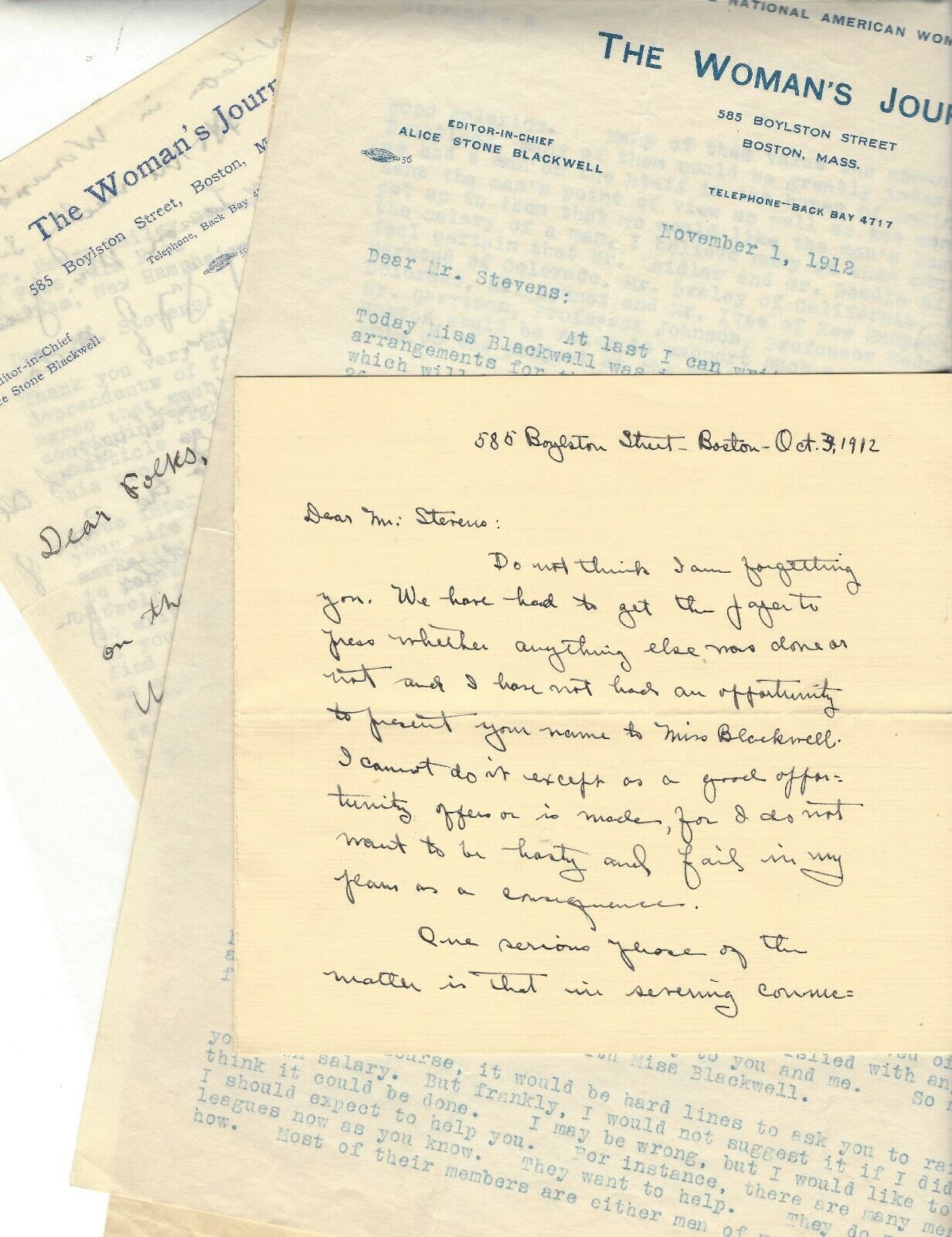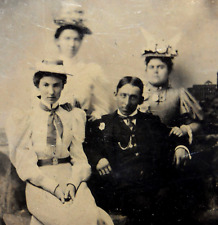When you click on links to various merchants on this site and make a purchase, this can result in this site earning a commission. Affiliate programs and affiliations include, but are not limited to, the eBay Partner Network.
Woman\'s Journal Staff Seeks To Attend The National Convention In 1912; Alice Stone Asked For Advice
WOMAN’S JOURNAL was an American women’s rights periodical published from 1870 to 1931. Founded in Boston, MA, by LUCY STONE and her husband HENRY BROWNE BLACKWELL as a weekly, it was purchased in 1917 by CARRIE CHAPMAN CATT’s Leslie Woman Suffrage Commission and merged with The Woman Voter and National Suffrage News to become known as The Woman Citizen. It served as the official organ of the National American Woman Suffrage Association until 1920, when the organization was formed as the League of Women Voters and the Nineteenth Amendment to the United States Constitution was passed granting women the right to vote. In 1927, it was renamed The Woman’s Journal. It ceased publication in June 1931. The Journal’s contributing writers included Julia Ward Howe, Louisa M. Alcott, Mary A. Livermore and Elizabeth Stuart Phelps.
Archive of four letters, 8 pp, various sizes, with historic information about the struggling days of the suffrage movement. The archive begins in 1912 when Alice Stone Blackwell, daughter of Lucy Stone and Henry Browne Blackwell, is the Editor-in-Chief of the Journal, and its financial difficulties and need for more workers is creating a problem. The Journal had inherited a huge debt that left it financially strapped while its increasing workload required the hiring of more employees.
AGNES EDNA RYAN, Managing Editor of the Journal, writes a 3 pp, 5 ¾ x 5 1/2, October 3, 1912, ALS to Henry Stevens, of Hooksette, NH, regarding her desire that he work for the Journal. Stevens later worked for the Journal and married Ryan in 1915. Stevens and Ryan would later resign from the Journal due to their opposition to World War I, a belief not generally shared by the suffrage movement.
“Do not think I am forgetting you. We have had to get the paper to press whether anything else was done or not and I have not had the opportunity to present your name to Miss Blackwell. I cannot do it except as a good opportunity offer or is made for I do not want to be hasty and fail...as a consequence.
“One serious phase of the matter is that in severing communications with the national now, we are left with a handicap of $7,000 in debt (equivalent to about $190,000 in 2021) – the National’s debts – but [now] our handicap. So until we know when they might pay this and until we see how we are coming out, we dare not engage other workers. The next three months are going to be a hard pull but if I could see where your salary is coming from, I would be better able to press the matter with Miss Blackwell.
“I am going to present the matter to her tomorrow, the fourth, and hope to be able to give you some kind of answer Friday night. I know we shall pull through but we must proceed carefully. Of course we must have more assistance on the paper else we shall be ‘pennywise and pound foolish’ but just how far we dare to venture just now and what might we have to get you here is a serious question.
“When I wrote you before I did not know we should be required to meet the $7,000 – which is not our debt.”
A MONTH LATER ON NOVEMBER 1, 1912, Ryan sends a two-page, TLS, to Stevens on The Woman’s Journal letterhead, The Official Organ Of The National American Woman Suffrage Association. “At least I can write you something definite. Today Miss Blackwell was in the office and we talked about our arrangements for the week of the National Suffrage convention which will be held in Philadelphia, Pennsylvania, November 21 to 26.
“I told her about you and suggested that we ask you to come to Boston and get in touch with the work between now and November 21, so that you could be well enough acquainted with our work to do a good part of our work during our absence at Philadelphia.
“I told her I thought we might try you during this time and see if you could be sufficiently helpful to warrant our offering you a position. We agreed that both she and I need assistance badly.
“She approved of trying out and having you with us for future work if you proved the right person, but said she did not see where your salary would come from.
“I told her I have a little plan which I would like to propose to you, namely, to engage you if you would agree to raise your own salary among the members of the various men’s leagues for equal suffrage.
“She thought that rather hard lines for you, and said that whatever else we tell you, we must make it plan that we are not in a position to pay for another helper at this time.
“When I had promised her that I would let you know how dubious the financial situation is, she said she approved of my putting my proposition to you and would be satisfied with any arrangement that would be satisfactory to you and me. So much for our talk, i.e., the talk with Miss Blackwell.
“Of course, it would be hard lines to ask you to raise your own salary. But frankly, I would not suggest it if I did not think it could be done. I may be wrong, but I would like to try – I should expect to help you. For instance, there are many men’s leagues now as you know. They want to help. They do not know how. Most of their members are either of means or they earn good salaries. Many of them value the Woman’s Journal highly. Doubtless, many of them would be greatly interested to know that we had a man on the staff in the hopes of making the paper more adequately present the man’s point of view as well as the woman’s. If it were put up to them that we would like the men’s league members to pay the salary of a man, I believe many of them would respond. I feel certain that Mr. Laidlaw and Mr. Beadle of New York, Mr. Garwood of Colorado, Mr. Bradley of California, Judge Lindsey of Colorado, Mr. Bynner and Mr. Ives of New Hampshire, Mr. Meade, Mr. Garrison, Professor Johnson, Professor Geddes and others of Boston would be ready to support such a project. I would try to help on the project at the National Convention, too.
“Now, what do you think? Do you want to consider it? Do you want to try us out and let us see how you get along? What salary would you have to have? Miss Blackwell suggested that possibly you could work for us quite reasonably and if we could not pay you what you ought to have later on, you could use us as a stepping stone to what you want ultimately.
“I am wondering if you have given us up. From your last letter, I take it you have not. Will you write to me or come to see me – which? We ought to know as soon as possible on account of the arrangements pending at the National Convention...”
A YEAR LATER, The Woman’s Journal has hired Henry Stevens. 2 pp, 6 x 9 1/2, ALS, on The Woman’s Journal stationary, November 24, 1913, to “Dear Folks, I am glad you are both on the firing line and hope the Union publishes your letter. I will see that the paper goes to the R.N.Y.
“Miss Ryan wrote that Miss Kimball had made Anna a delegate and that she joined the Concord Ass’n through Mrs. Jenks 10 seconds before! It is fine, because it lets her in on all the privileges. It has been an exciting convention and will be and should be the time of her life!
“She said they were having some huge signs printed: “Read to Pres. Wilson in Woman’s Journal this week. The meeting Sunday Mrs. Abelson, Miss Lawson, Mrs. Jeanson of Wisconsin, Miss Mary Gay of Boston, Anna and Miss R. sold papers...
“I put the paper to press this p.m. Had to write the whole convention story myself as Miss R’s staff was not sent in time. Am waiting at the office now for a telegram telling the officers elected this p.m...”
The final letter is from KATHRYN PAULSEN, who wrote plays, fiction, non-fiction and poetry, to Henry Stevens, October 31, 1972, seeking information on the descendants of feminists. “...I agree that much credit is due Alice Paul for her long and continuing fight for women’s rights, and I hope perhaps to do an article on her and the Woman’s Party when I have finished this project.
“I was interested to hear that you had written a biography of your wife (Agnes Edna Ryan) and am sorry your agent has had so much trouble marketing it. Do you know whether [someone] has tried sending it to magazines for possible excerpt, or would the book not lend itself to such treatment? If you have the time or inclination to write magazine articles, it occurs to me that an account of your work with your wife in the suffrage movement might find a ready market. (The story of your marriage and work – for example of a husband and wife working together for women’s rights that would certainly be rare today – might be of special interest to MS (magazine). If you were interested in doing such a piece for them, you might write to Nina Finkelstein, who is the editor I am working with there.)
“I leave Thursday for a month in England and France (including, I am hoping, a visit to some descendants of Elizabeth Cady Stanton). I should be delighted to meet you if I have an opportunity to come to Vermont later this winter.”
Letters are in excellent condition overall. A couple of edge chips to the first letter and one folds tear has been repaired with archival tape. A fine example of Women’s suffrage Americana.
Everything we sell is guaranteed authentic forever to the original buyer. We also offer a 30-day return policy. If you discover a problem or are dissatisfied with an item, please contact us immediately. Our goal is to please every customer. We are pleased to be members of The Manuscript Society, Universal Autograph Collectors Club, The Ephemera Society, the Southern New England Antiquarian Booksellers and the Preferred Autograph Dealers and sale Houses. [WR 108]







